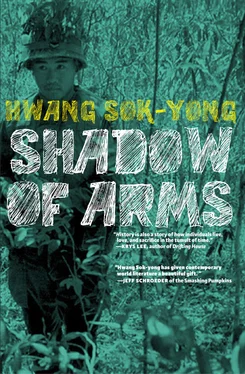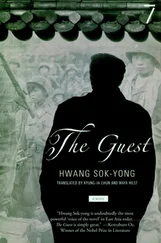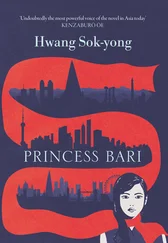Someone walked into the store. Out of the corner of his eye, Minh recognized him as a youth he had often seen at the assembly camp. He was dressed in a clean white shirt and gray pants, with his hair neatly combed back. The black horned-rim glasses he had on were unfamiliar, so at first sight Minh had difficulty placing him, but he had kept the same moustache. Minh, standing with the three bundles of printed matter at his feet, turned around and gave him a questioning look. The youth strolled past the shelves and halted at his side. He then pulled a book down from the shelf and in a low voice said, “I’m the leader of cell A.”
Pham Minh glanced down at his own feet and whispered, “Take one.”
“Any other orders?”
“It’s all in there.”
The youth casually stooped down and picked up one of the books, then made a round of the store before leaving. Minh put the remaining package under his arm and picked a book at random from the shelf to buy and went farther inside the store. Before handing it to the owner he checked the cover and discovered that it was a collection of Baudelaire’s prose.
“Wrap this up, please.”
The woman wrapped the book without showing any sign of having noticed anything out of the ordinary.
“Two hundred piasters, please.”
Minh paid and the woman nodded in a cursory bow to him. Once back out on the street, Minh wondered where he should head next. The streets were still relatively quiet. He had no choice but to go home. It would still be two days before he could start working at Cuong’s warehouse. He had no idea what he could do with the bundles of leaflets for the time being. On his way home he bought some fresh pork and a can of condensed milk from a street vendor. When he arrived home, he found his mother and Mi sitting face-to-face drinking green tea.
“Come and sit down here, you,” his mother said.
Mi stared into the teacup and did not look up at him.
“Is this how you two boys are going to be? Do you think I’m a bump on a log? I hear you’ve been out to Son Tinh and seen that bitch. .”
“Who told you that?”
“So, the two of you are pouring your hearts out to each other behind my back. If your father were alive, your brother would never dare do this to me. That bitch of a bar girl has nothing to do with our family. So why did you go snooping around there?”
“I went on an errand for Big Brother,” Minh said without giving his reply a thought.
“That’s a lie. . you went there to ask her to help you get a job, didn’t you? Don’t you have any self-respect?”
What a great teller of tales his sister Mi had been, Minh said to himself as he let out a feeble laugh.
“Right, I asked her to talk to Big Brother. I see nothing wrong with that, do you?”
“Now that you’ve quit school, what good will it do for you to get a job with the help of those filthy creatures?”
“I need to make money. When I finish my military service, I’m going abroad to study. Anyway… all of us are eating the bread that Big Brother brings home, isn’t that a fact?”
“Quyen and you are both my sons. If he breaks up with that bitch, I’ll make a living even if I have to go out and peddle noodles on the street,” his mother said in a sniveling voice.
“You can’t find a man with a clear conscience in Vietnam anymore. I’ve no doubt I can make as much money as Big Brother can. I’ve already lined up a job, so don’t be worrying about me, Mother. And, Sister, I’d like to say a word to you, too. Will you listen to me?”
“Go ahead,” Mi said in a cold voice, avoiding Minh’s eyes.
“Do me a favor and stop comparing me to your husband.”
Their mother intervened. “Goodness, you’re giving me a headache. Don’t even mention that man in my presence. I trusted the bastard, you know, and such a vile Viet Cong he turned out to be. .”
“Mother. .”
Pham Minh’s tone was reproachful toward his mother, but Mi glared at him with fire in her eyes.
“Don’t you dare insult the dead.”
“Sister, what’s gotten into you? You never used to be like this. I’m still the same old me. I just don’t understand why our family always has to hurt each other when we sit down together.”
Mi grabbed the cups and the teapot and jumped to her feet.
“Ask Quyen. Maybe he’ll explain.”
The loud clinking of dishes being washed in the kitchen started to grate on Minh’s nerves. He went into Quyen’s unoccupied room. In it there was an old wicker bed with the bamboo sticking out, and some chairs and odds and ends. He tossed the bundle of leaflets down and fell onto the bed. He lit a cigarette but soon felt as if his chest and neck were bursting from suffocation. He wanted to scream: I have to leave this house, get away from this family. But he couldn’t go anywhere without permission from the committee.
In his training he had been taught that the first essential condition for an urban guerilla to carry out his mission was to lead an ordinary existence. Revolution was not something realized by some dramatic events that occur one day out of the blue. A revolutionary fighter must battle with everyday routines and constantly build resolution as he lives day to day. Only upon such a foundation will he gain a capacity to induce dramatic events. Like the simple farmer who takes up his weapon as a sign of resistance after generations of his ancestors have lived in misery, revolution is not a brilliant flare but a rock-like sediment of silence.
Consequently, a revolutionary is not an anarchistic flower but a rock thrown into the wilderness of indifference surrounding it. At long last, these rocks will one day make a mound of rocks and they will strike and sparkle, roll and fly, their whole beings transformed into weapons. Unless he could survive at home, unless he tried to be one with his family, Pham Minh realized he would never be able to carry out a single task effectively.
His heart lightened. He extinguished the cigarette. He heard the sound of a bicycle bell. Lei must have come home for lunch. Minh reached over his head and locked the door. He heard Lei’s footsteps entering the kitchen. Broken-hearted, his mother seemed to have retreated to her room. As he lay there using his arms as a pillow, Minh’s thoughts again focused on the leaflets: I’ll be an effective agent, I’ll carry out missions never before accomplished by anyone in any of the units. He picked up the bottom bundle of leaflets, the one for cell C. Inside the thick dictionary cover there were about two thousand sheets of paper. A note was tucked into the top of the bundle. He took it out and read:
The purpose of the present leaflets is twofold: one educational purpose is to enhance the personal capacities of liberation fighters and the cooperative operational ability of each cell. The other is to constantly remind the people of the actuality of the NLF. The members of each cell should distribute them extensively in the areas under their responsibility, keeping within the bounds of personal security. Time: this Saturday evening. Place: the whole expanse of refugee hamlets from Bai Bang to Somdomeh. Each cell must fix individual mission areas and conduct at least two preliminary surveys and dry runs. The leader of the cell is to collect opinions of the cell afterwards and make a verbal report of the results through the chain of operations.
Pham Minh picked up a copy of the leaflet and read it. It was the essential principles of the South Vietnamese National Liberation Front. He had read it dozens of time and was even tested on it while training at Atwat. The text began as follows:
Ever since the French colonialists first occupied our country, we, the Vietnamese people, have never ceased to fight for the independence and freedom of our nation. Our fellow countrymen throughout the nation, who had shattered Japanese and French imperialism in 1945, continued their cooperation and, as a result of the heroic war of resistance, won a great victory over the French invaders and the American interveners, thus leading the building storm of national resistance to culminate in a glorious victory. At the Geneva Conference in July 1954 the French imperialists had no choice but to agree to the withdrawal of their military forces from Vietnam. The nations participating in the Accords made a solemn declaration on the sovereign independence of Vietnam, promising her unification as well as approving the preservation of her territorial frontiers.
Читать дальше












